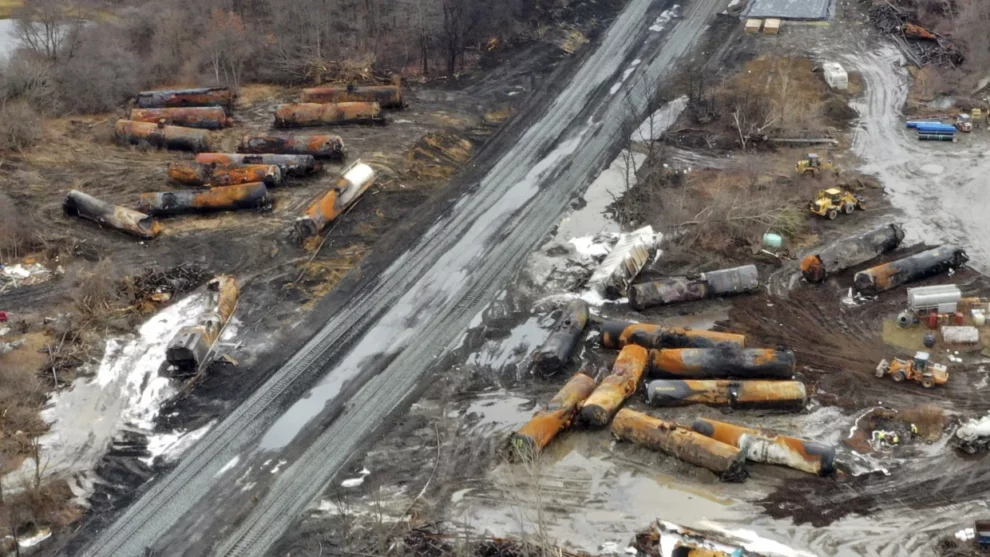Since returning to work following the derailment of a Norfolk Southern train carrying hazardous chemicals, Rick Feezle said he has had a raspy voice and chest pain.
His wife has experienced sore throats and headaches, he said.
Feezle, 63, said he has worked in the area around East Palestine, Ohio, all of his adult life and operates two businesses there: a salvage yard and an auto shop.
He’s part of a group of people who live or work near the derailment site who have filed a class action suit against Norfolk Southern. The Feb. 3 incident resulted in a fire and chemical spill, forcing residents within a roughly 1-mile radius to evacuate. Several days later, the rail company released and burned vinyl chloride — a flammable gas — a move officials said would alleviate the risk of an explosion.
Authorities said residents could return home two days after that.
“Nobody can tell us what we should do other than ‘It’s safe, go head on back in there,'” Feezle said, his voice crackly. “And the fish are dying and animals are dying and I can hardly talk and my chest hurts.”
His lawsuit is one of at least six class action suits already filed against Norfolk Southern since the accident. For the most part, those suing the company allege that they’ve lost income due to evacuations, were exposed to cancer-causing chemicals and no longer feel safe in their homes.
Norfolk Southern said it was “unable to comment directly on litigation.” But in a public update on Thursday, the company noted that in addition to its ongoing cleanup work, it was distributing more than $2 million in financial assistance to affected families and businesses to help with the costs of the evacuation, as well as creating a $1 million fund for the community.
Feezle and his fellow plaintiffs are requesting compensation from the company for lost business revenue and expenses incurred during their evacuations. They’re also seeking punitive damages for exposure to toxic chemicals.
The Environmental Protection Agency classifies vinyl chloride as a carcinogen, and routine exposure can increase one’s risk of liver cancer or damage.
Another recently filed class-action, not involving Feezle, alleges that the rail company “discharged more cancer causing Vinyl Chloride into the environment in the course of a week than all industrial emitters combined did in the course of a year” in the U.S.
Lisa Sodergen, a plaintiff in that suit, said in legal filings that her house was “surrounded by toxic black smoke” that irritated her lungs, eyes and skin. Sodergen lives in Lawrence County, Pennsylvania, about 5 miles from the derailment site, which is outside the evacuation zone.
“She lives with ongoing pulmonary irritation and fear for the long-term consequences to her health and water supply,” the suit alleges.
Along with another plaintiff, she is seeking damages for the increased risk of future illness and costs of medical monitoring to ensure the early detection of disease.
Rene Rocha, an attorney at Morgan & Morgan Lawyers who represents Sodergen, said both plaintiffs in that case have had ongoing health issues that arose after the derailment.
“When you talk to them, they run out of breath or start coughing,” he said.
As of Thursday, the EPA has helped evaluate the indoor air in more than 500 homes, in conjunction with Norfolk Southern, and has not detected vinyl chloride above levels of concern in any of them. Gov. Mike DeWine said Thursday that the municipal water was safe to consume, based on the results of sampling and tests done by the EPA, Norfolk Southern and other agencies.
In an open letter, Norfolk Southern CEO Alan Shaw promised to stay in the area “as long as it takes to ensure your safety and to help East Palestine recover and thrive.”
Feezle said his employees — which include many of his family members — are still drinking bottled water, since they’re not convinced that the water supply is free of contamination. The Ohio Department of Health is recommending that people who get their drinking water from private wells use bottled water until those wells are tested.
Feezle also said he has heard customers complaining about the lingering stench in the air. The EPA said last week that byproducts of vinyl chloride can emit smells at levels lower than what is considered hazardous.
Before making decisions about whether to keep operating his businesses in East Palestine, Feezle said, he’s waiting on independent water and air quality tests, which are being organized by his lawyers starting next week. Until the derailment, he said, he had been planning to pass his two businesses on to his children and employees one day.
“If it’s bad and it’s gonna kill us, let us leave,” he said. “It’s gonna be a lot of bankrupt people and a lot of people that will take a long time to get started again, but least we’ll be alive.”
Feezle also owns several rental properties in town, at least four of which are in the evacuation zone, he said.
“The first person that really gets sick, that town is going to be a ghost town,” he said. “My businesses will be closing down, and I’ve worked all my life. I started in business when I was 19 and worked for myself that whole time. And my property values are going to plummet. I believe it cost me millions of dollars, the train wreck.”
On top of all this, Feezle added, he is scared that he or his family members might develop cancer someday.
“I’m afraid we’re all gonna be out of here in five years, one way or another,” he said.
source: NBC










